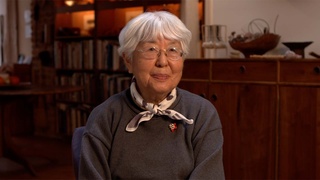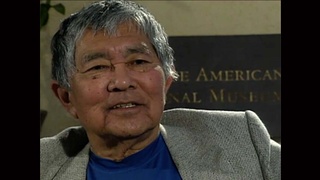Interviews
Choice to move east or go to Japan
The government said, I think United States and Canada knows Japan's gonna be... so before that, if you want to stay in Canada, move to east. Unless if you're gonna go Japan, you stay in Tashme. So the family in Tashme, we're the one family moved east. We're the first one, because when we moved, that day, it was a German was... so we were scared if a soldier saw us in the train, what... so Bob said, Just keep quiet, what they say everything, just keep quiet. Don't talk to them. But they didn't bother us. You know, they think we're Indian or something. [Laughs]
I*: How, how was the decision, because you could go to, I mean, the government will pay you to go to Japan, or move east. There was, how was that decision made?
Oh, yes, my father-in-law wants to go back to Japan. Of course, he was the oldest in the family, but I thought the younger one -- of course Miyoko speak Japanese and English both. But the others doesn't know how to speak Japanese. So I said, How could you take these girls to Japan? Well, good thing we didn't. Afterwards, we heard that they haven't got enough food, even the oldest family, my father-in-law was. You know, we haven't got the money. If you have lots of money to take to Japan is a different story. But those days, who got it, that kind of money? Especially we have to evacuate from their hometown and everything. So well, good thing we moved.
* "I" indicates an interviewer (Peter Wakayama).
Date: February 14, 2005
Location: Toronto, Canada
Interviewer: Peter Wakayama
Contributed by: Sedai, the Japanese Canadian Legacy Project, Japanese Canadian Cultural Center
Explore More Videos

Father was convinced the constitution would protect him
(b. 1935) Sansei businessman.


General reasons why people left Japan for Peru
Okinawan American whose parents are from Peru.

The lack of discussion about family’s incarceration in Amache
Sansei judge for the Superior Court of Los Angeles County in California


Her mother came to the U.S. with a group of picture brides
(b. 1923) Japanese American poet, activist

Her father bought her mother American clothes after she arrived from Japan
(b. 1923) Japanese American poet, activist

Her brother’s reasons as a No-No Boy
(b. 1923) Japanese American poet, activist

Her grandfather was pressured to teach Japanese
Sansei judge on the Superior Court of Los Angeles County in California

Neighbor took care of her mother after grandfather was taken by FBI
Sansei judge on the Superior Court of Los Angeles County in California

Immediately after the bombing
(b. 1938) Japanese American. Hiroshima atomic bomb survivor

Other family members not as lucky
(b. 1938) Japanese American. Hiroshima atomic bomb survivor

His parents had little hope that he had survived the atomic bomb
(b. 1938) Japanese American. Hiroshima atomic bomb survivor

His views on nuclear weapons
(b. 1938) Japanese American. Hiroshima atomic bomb survivor

Loss When Leaving for Manzanar
Japanese American animator for Walt Disney and Hanna Barbera (1925-2007)
